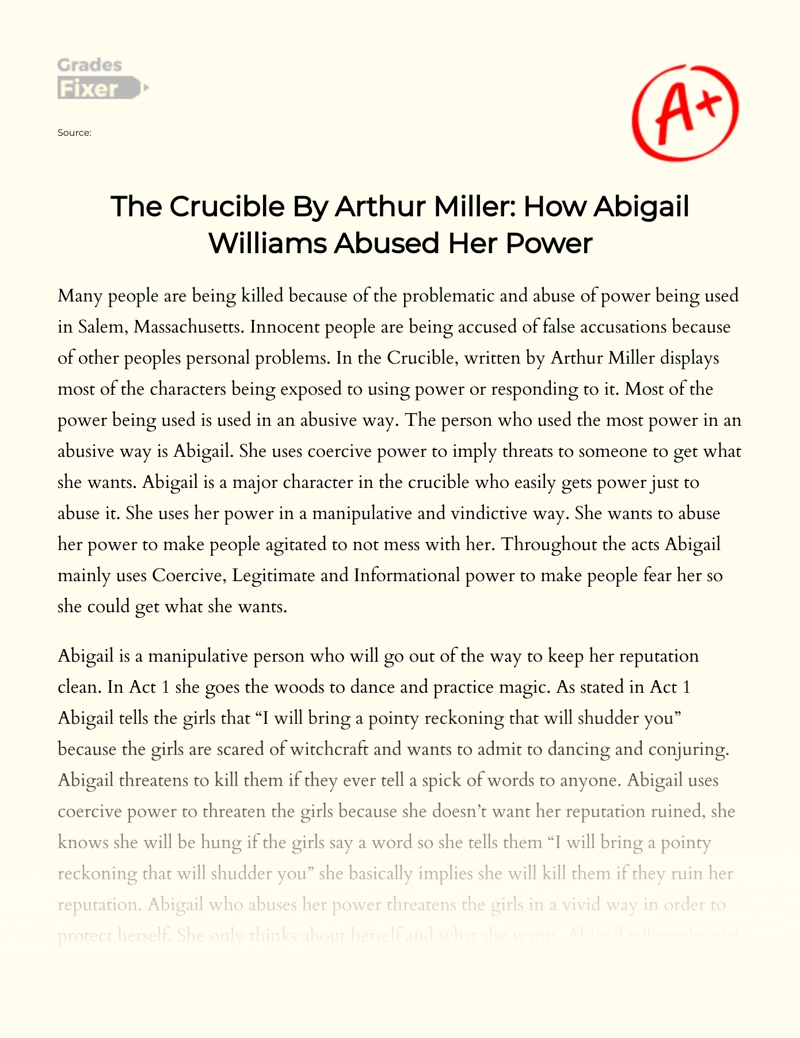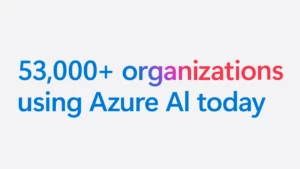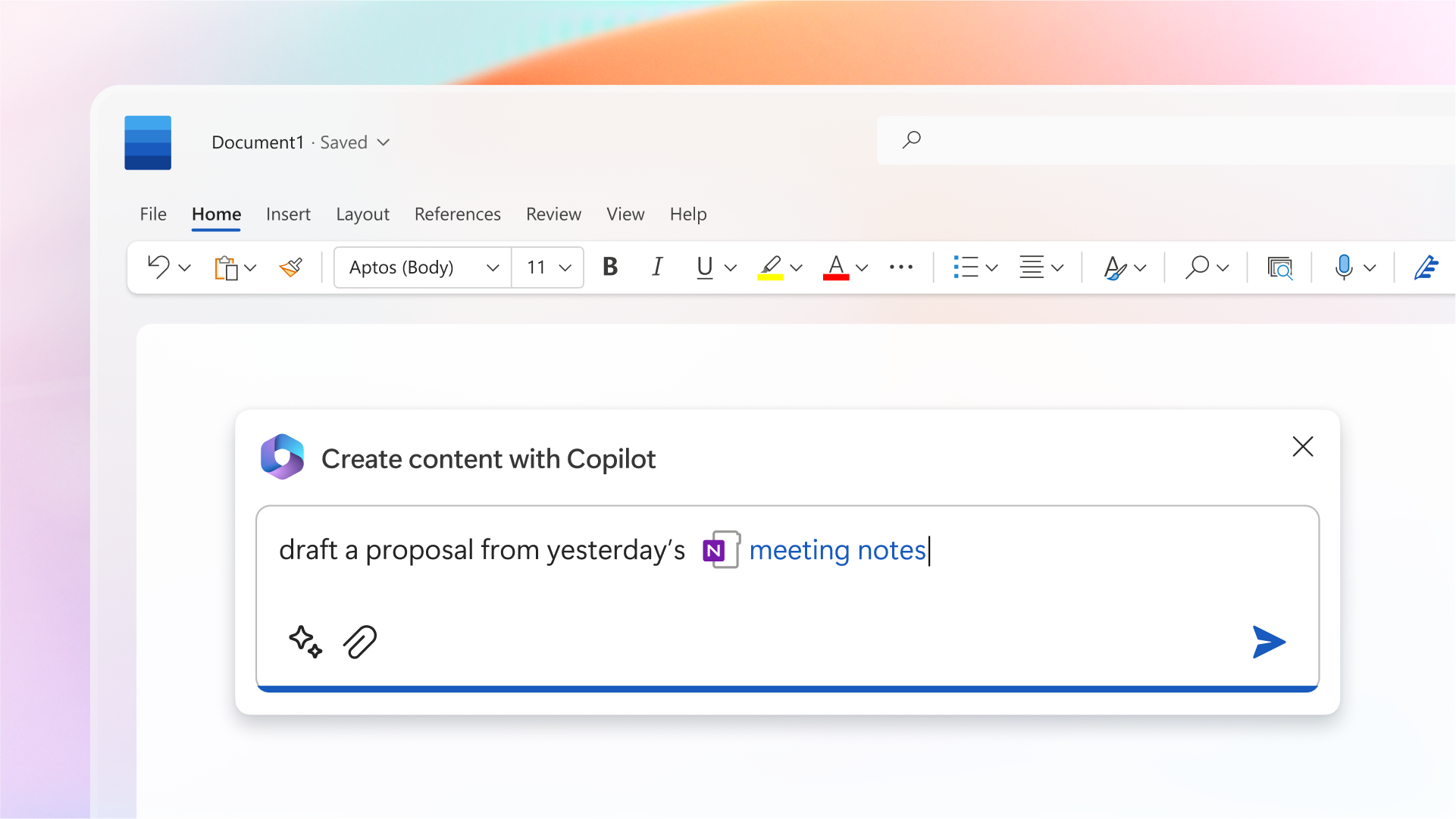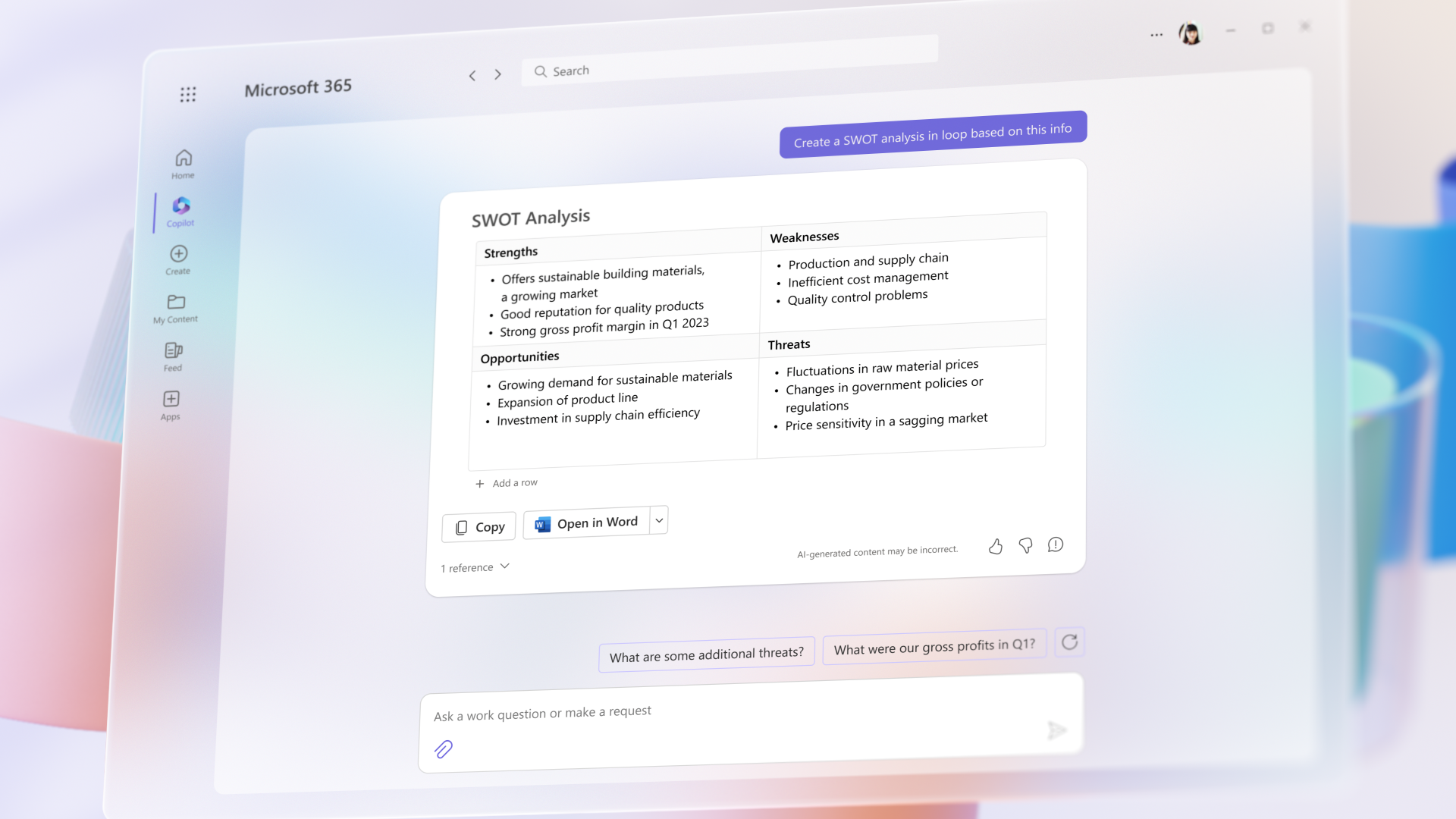Power, Authority, Abuse in Politics and Society Essay
- To find inspiration for your paper and overcome writer’s block
- As a source of information (ensure proper referencing)
- As a template for you assignment

Introduction
Why do people abuse their power, how does authority affect people around, works cited.
Power is a national or political expression of authority. By nature, it aims to establish positive societal regulations yet can cause negative outcomes in combination with abuse. As a rule, power exists in every layer of the social organization from the classroom environment to political parties. Power abuse is the use of official power in personal interests resulted in a violation of legally protected interests of citizens, organizations, or society. Although people understand that the authorities often abuse their power, the first is likely to follow the orders of the latter.
According to Dubois, “power lowers inhibitions and produces a higher-than-average self-focus” (par. 5). Several studies confirmed the effects of power on the psychology of the individual. Feeling their power, people begin to think, experience, and even act not as those who consider themselves powerless. There are different cases in which a person tends to abuse his or her power including a large income, high positions, belonging to the privileged class, or just a wider choice in certain situations. Such people are more likely to lie and be rude. For example, the drivers of luxury cars rarely stop for pedestrians, and the members of the upper-income classes often lie and cheat during the negotiations for the sake of winning.
Leveillee states that “human individuality is often subverted by the blind obedience humans feel towards those in a position of power” (par. 1). Obedience is a fundamental basis of society. Let us consider the effects of authority power abuse on the example of an ambitious experiment initiated by Professor Philip Zimbardo on August 14, 1971, when several young men had to try on the role of guards and prisoners in jail that was artificially recreated at the Stanford University (Zimbardo 8).
The experiment is a psychological study of human responses to freedom restriction in conditions of prison life and the impact of the imposed social role on behavior. Initially, guards and prisoners had no difference from each other and were characterized as normal people. Experimenters observed their behavior, cognitive and emotional reactions, and the emerging system of relationships.
The experiment quickly got out of control. The guards behaved aggressively and mocked at prisoners, and, by the end, the latter showed rigorous emotional disturbance. If the first day went in a quiet atmosphere, the second day brought a rebellion. The guards voluntarily worked overtime and suppressed the rebellion without guidance from researchers, attacking prisoners with fire extinguishers. After this incident, the guards tried to divide prisoners and set them against each other distinguishing good and bad ones. These measures had a significant effect, and further large-scale disturbances occurred. The prison became dirty and gloomy. The right to wash was a privilege that could easily be denied. The guards forced some of “bad” prisoners to clean toilets, a tactic that is similar to that used in the United States prisons.
This experiment clearly shows power abuse occurred in ordinary people after they were given corresponding power. It proves the fact that it is important to understand the necessity to control power avoiding improper attitudes towards others. At that, the system of power is necessary for any society. Only a person living in isolation does not need to respond by obedience or disobedience to the authority of others. Obedience as a determinant of behavior is especially important in the modern world.
It is a mechanism of psychological coercion of the individual to act in a certain direction under specific circumstances. The tendency of people to obey the authority of the government connects them with the power system. The facts of history, as well as observations of everyday life, suggest that the subordination can be completely natural and even predominant attribute of ethical, moral, and appropriate behavior.
The experimental results demonstrate the sensitivity and obedience of people when there is a justifying ideology, supported by society and the state. Moreover, the results showed that the need for obedience to authority is rooted in people’s consciousness so deeply that the prisoners continued to follow the instructions despite the anguish and strong internal conflict. The Stanford experiment demonstrates that the authorities can have a strong influence on people and even control their behavior, causing them to commit inhumane acts and violence against others. This study shows the willingness and readiness of average adults to following the instructions of the authority.
In conclusion, it should be emphasized that the authorities having power over others can affect people negatively by abusing their power. In an attempt to investigate the nature of power and its effects, Zimbardo conducted the Stanford experiment and pointed out that obedience is inherent in people. This is the reason for the fact that the prisoners in his experiment followed all the orders of guards. In turn, the latter acted as real prison overseers and took the initiative in toughening the prisoners’ conditions. It was revealed that people having received power tend to change their way of thinking and opinion towards ethics.
Dubois, David. “The Two Big Ways Power Transforms a Person.” Harvard Business Review . Harvard Business Review. 2016. Web.
Leveillee, Nicholas. “The Role of Obedience in Society.” Inquiries . Inquiries. 2011. Web.
Zimbardo, Philip G. The Lucifer Effect: How Good People Turn Evil . London: Rider, 2011. Print.
- Opinion and Clarification of the Stanford Prison Experiment
- System & Situation in “The Lucifer Effect” by Zimbardo
- The Book "The Lucifer Effect" by Philip Zimbardo
- Youth Leadership Development
- Youth Activities in Kuwait
- Karl Marx: Critique of Capitalism
- Rogue States as Subjective and Objective Concept
- Democratic Consolidation in Asia
- Chicago (A-D)
- Chicago (N-B)
IvyPanda. (2020, August 22). Power, Authority, Abuse in Politics and Society. https://ivypanda.com/essays/power-authority-abuse-in-politics-and-society/
"Power, Authority, Abuse in Politics and Society." IvyPanda , 22 Aug. 2020, ivypanda.com/essays/power-authority-abuse-in-politics-and-society/.
IvyPanda . (2020) 'Power, Authority, Abuse in Politics and Society'. 22 August.
IvyPanda . 2020. "Power, Authority, Abuse in Politics and Society." August 22, 2020. https://ivypanda.com/essays/power-authority-abuse-in-politics-and-society/.
1. IvyPanda . "Power, Authority, Abuse in Politics and Society." August 22, 2020. https://ivypanda.com/essays/power-authority-abuse-in-politics-and-society/.
Bibliography
IvyPanda . "Power, Authority, Abuse in Politics and Society." August 22, 2020. https://ivypanda.com/essays/power-authority-abuse-in-politics-and-society/.

Essay on Abuse Of Power
Students are often asked to write an essay on Abuse Of Power in their schools and colleges. And if you’re also looking for the same, we have created 100-word, 250-word, and 500-word essays on the topic.
Let’s take a look…
100 Words Essay on Abuse Of Power
Understanding power abuse.
Power abuse means when a person who has authority uses it in the wrong way. This can be a boss, a teacher, a police officer, or even a parent. They use their position to control or harm others. This is not fair or right.
Types of Power Abuse
Effects of power abuse.
Power abuse can hurt people in many ways. It can make them feel scared, sad, or angry. It can also make them feel powerless and lose their self-confidence. In some cases, it can even lead to physical harm.
Stopping Power Abuse
Stopping power abuse is not easy, but it is possible. People need to speak up when they see it happening. And those in power need to be held accountable for their actions. This means they should face consequences if they abuse their power.
Power Abuse and Society
250 words essay on abuse of power.
Power abuse is when someone in a position of authority uses their power wrongly. This can be in a school, a workplace, or even in a country. It happens when the person in charge uses their power to make others do things they don’t want to do or to get what they want without thinking about the effects on others.
There are many types of power abuse. One common type is bullying, where someone uses their power to hurt or scare others. Another type is corruption, where someone uses their power to gain money or goods unfairly. Discrimination is also a type of power abuse, where people are treated badly because of their race, gender, or other factors.
Power abuse can cause a lot of harm. It can make people feel scared, sad, or angry. It can also lead to people not trusting each other or the person in power. In extreme cases, power abuse can even lead to violence or war.
Preventing Power Abuse
To stop power abuse, we need to make sure that people in power are held accountable for their actions. This means that they should be punished if they abuse their power. We also need to educate people about power abuse so they can recognize it and stand up against it.
In conclusion, power abuse is a serious problem that can cause a lot of harm. But by holding people accountable and educating others, we can help to prevent it.
500 Words Essay on Abuse Of Power
Understanding power, what is abuse of power.
Abuse of power happens when someone uses their power in a bad way. This can mean making choices that help themselves instead of others. It can also mean using their power to hurt or control people. For example, if a boss threatens to fire an employee unless they do something they’re not comfortable with, that’s an abuse of power.
Examples of Power Abuse
Abuse of power can be seen in many places. In schools, a teacher might pick on a student because they don’t like them. In the workplace, a boss might give all the good tasks to their favorite employees. In politics, a leader might use their power to make laws that only benefit them and their friends.
When power is abused, it can hurt people and make them feel small. It can also cause fear and stress. If a teacher is always picking on a student, that student might start to hate school. If a boss is unfair, employees might feel unhappy at work. When a leader abuses power, people can lose trust in their government.
How to Stop Power Abuse
Abuse of power is a problem that can happen anywhere. It can hurt people and make them feel scared or unhappy. But by knowing what it looks like and how to stop it, we can make our world a fairer place. Remember, power is a tool, and like any tool, it should be used with care.
Apart from these, you can look at all the essays by clicking here .
Happy studying!
Leave a Reply Cancel reply

Abuse of Power | Definition, Types & Examples
David Kuot has taught Business in Capella University for over 2 years. They have a Doctor of Philosophy-PhD, candidate, Business management strategy &Innovation from Capella University. They also have HTML and Latex certifications.
Artem has a doctor of veterinary medicine degree.
What is considered an abuse of power?
Every situation in which an individual uses their authority to look down upon the less powerful individual is considered an abuse of power. When an individual in charge takes advantage of his power to bully, manipulate and intimidate his subordinates is considered an abuse of power. Abuse of power also occurs when a leader financially, physically, or sexually abuses the public or juniors.
What are the three types of power abuse?
Abuse of power occurs in different forms. It is categorized into physical, financial, and sexual abuse. Physical abuse involves causing bodily harm to other individuals, while financial abuse involves using funds meant to help the public or other individuals for personal or family gains.
What are examples of abuse of power?
Abuse of power occurs in different ways. Some examples of abuse of power include causing emotional stress to other individuals. Another instance is when a leader engages in sexual contact with their juniors without their consent, such as unwanted touching.
What are the consequences of abuse of power?
Some consequences of abuse of power are diverse. They include high employee turnover, which occurs when employees are ill-treated. As a result, they opt to look for other job opportunities. Additionally, abuse of power causes stress to employees resulting in low performance.
Table of Contents
What is abuse of power in leadership, abuse of power types, abuse of power effects, abuse of power examples, lesson summary.
Abuse of power was historically common. It is also typical today, due to advanced technology and social changes. Abuse of power is defined as using a powerful position to take unfair advantage of others in a given organization, public office, or government. Power refers to the ability to influence the actions and behavior of other individuals, with or without resistance, to achieve a particular objective. In simple terms, it is the ability to exert authority over an individual to get things done. Abuse of power in leadership is bullying that involves misusing superiors' authority in the workplace. Higher ranking officials who abuse authority mainly tend to harass the juniors—thus negatively affecting performance and the company's success. Abuse of power in leadership involves blackballing, public criticism, and ridicule. Misuse of power is primarily based on deceit and is quite common in places with inadequate supervision of superiors. The most common areas of power harassment include schools, universities, colleges, private organizations, churches, hospitals, and public offices. Other names of abuse of power include misconduct, mismanagement, power harassment, corruption, incompetence, malpractice, negligence, ill-treatment, misconduct, exploitation, bad government, etc.
To unlock this lesson you must be a Study.com Member. Create your account

An error occurred trying to load this video.
Try refreshing the page, or contact customer support.
You must c C reate an account to continue watching
Register to view this lesson.
As a member, you'll also get unlimited access to over 88,000 lessons in math, English, science, history, and more. Plus, get practice tests, quizzes, and personalized coaching to help you succeed.
Get unlimited access to over 88,000 lessons.
Already registered? Log in here for access
Resources created by teachers for teachers.
I would definitely recommend Study.com to my colleagues. It’s like a teacher waved a magic wand and did the work for me. I feel like it’s a lifeline.
You're on a roll. Keep up the good work!
Just checking in. are you still watching.
- 0:03 Abuse of Power
- 0:40 The Bully
- 1:22 The Manipulator
- 2:08 The Predator
- 2:38 Lesson Summary
Many ways involve misuse of power, especially by leaders. Government abuse of power is also common as the government officials use their position to take advantage of the public and their junior colleagues. High position leaders often make decisions that benefit themselves instead of their constituents or silence dissent. Leaders can also abuse their power by using it to manipulate or control others or to further their agenda at the expense of others. Abuse of power has been grouped as governmental and corporate deviance, economic, organizational, occupational crimes, and public corruption.
Abuse of Power by a Bully
Bullying refers to systematic abuse of power that involves aggressive behavior or intentional harm repeatedly done by superiors or leaders, resulting in an imbalance of power. Workplace bullying is either a social, verbal, psychological, or physical abuse by your employer, another individual, a superior official, or a group of people at work. The workplace bully may harm others by directly getting at them. Abuse of power by a bully involves severally threatening, physically insulting, or blackmailing employees for them to comply with something. Bullying from managers or leaders involves abuse of power by shouting or threatening individuals, getting them fired or demoted, negatively reviewing performance, and denying individuals time off or transfer to other departments. A bully's abuse of power may also involve individuals working at the same level or across departments who often bully through spreading rumors and gossip, work sabotage, emails, or criticism. At times juniors can also bully their superiors in various ways, such as continuously disrespecting their managers, spreading rumors about them, and refusing to complete tasks. In return, relationships between individuals are damaged—affecting employee performance, turnover, and the organization's success.
Abuse of Power by a Manipulator
Manipulation refers to strategies, tactics, actions, and behaviors that an individual uses to gain power and influence another. A manipulator is an individual who influences and controls another by using clever attempts to interfere with their decision-making process. They use different attempts such as passive-aggressive, denying, and lying to destroy another person's ability to reason, damaging their well-being emotionally and mentally. Abuse of power through manipulative means occurs in various instances, including misinformation. Leaders mislead their constituents by emphasizing the advantages of something while hiding its disadvantages or drawbacks. Due to their high positions, leaders may also shift incentive structures from one individual or department to another to secure personal advantages and enhance their prestige. They may reward unethical behavior for financial gain or take credit for success from one employee and give another employee. Other times, they may emotionally prey on their subordinates to increase their influence by causing doubt and confusion.
Abuse of Power by a Predator
A predator is someone who preys on others. In a workplace, a predator is usually an individual with power over others which extends to greed and exploiting their pleasure or gain. Power gives individuals an opportunity to act as predators because it shields them from the consequences of predatory behavior and actions. In most cases, men are the main predators who assault women due to their physical strength and social power. A predator's abuse of power in a workplace includes sexual harassment, discrimination, bullying, and intimidation. Predators may use their position of authority to exploit employees, often targeting those who are vulnerable or have little power within the organization. Leaders abuse their power through predation by violating their employees' personal and sexual rights, for instance, asking for sexual favors to give them a pay raise. At times they may attack or intimidate their subordinates through words making them feel scared, alone, and helpless. This type of abuse can profoundly impact victims, leading to physical and psychological distress.
Moreover, victims fear losing their current jobs/positions or being blocked from future employment. As a result, they may suffer from anxiety, depression, and post-traumatic stress disorder. Predators are also found in schools, churches, public government offices, and private organizations.
Abuse of power, which means harassment of power, is common in organizations with inadequate supervision over high-ranking individuals. Schools, hospitals, universities, and private organizations are mainly prone to power harassment. Below are some effects of abuse of power:
- Stressed employees. The most common reason for employee stress is workload. Abuse of power by bosses causes employee stress due to poor working conditions, job insecurity, and job dissatisfaction.
- Low employee productivity. If an employee is not productive, it may signify that they are unhappy with their job. This can be because of a hostile work environment created by those in power who take advantage of their position and abuse their authority. This can result in legal problems for the company.
- High employee turnover. The high employee turnover rate is likely due to the abuse of power by management. Employees may feel mistreated or unappreciated, and as a result, they may look for other employment opportunities. In return, they respect their bosses and help achieve the company's visions. Satisfying employees and treating them well helps cut down employee turnover and complaints.
The effects of abuse of power can be devastating, leading to loss of trust, respect, and credibility. It can also cause feelings of anxiety, depression, and insecurity. Reducing the effects of abuse of power may include providing employees with adequate resources and support, fostering a positive and healthy work environment, and creating a culture of respect and cooperation.
Abuse of power is a severe problem that often leads to social movements and revolutions. Abuse of power in leadership can take many different forms. The most common forms of abuse are physical, sexual, emotional, financial, and psychological.
- Physical abuse is the intentional use of physical force/violence such as hitting, shoving, or kicking against another person without their consent. One example of physical abuse of power in leadership is when a leader uses their physical stature to intimidate or threaten subordinates. Physical abuse is done through physical gestures, body language, or outright violence. This type of behavior instills fear in those on the receiving end and can prevent them from speaking up or challenging the leader. Ultimately leads to a more autocratic style of leadership, where the leader has complete control, and those beneath them are merely followers.
- Sexual abuse is any sexual contact or behavior that occurs without the victim's consent. It can be actual, threatened, or attempted sexual contact with another person without consent. Such may include rape, molestation, and sexual assault. Sexual abuse of power in leadership would be if a leader in a position of power used their position to coerce someone into a sexual act. This could be done by promising favors or benefits in exchange for sex or using threats or force.
- Financial abuse is the illegal or unauthorized use of another person's money or property. It includes stealing, fraud, and identity theft. One example of financial abuse of power in leadership is when leaders use their position to gain financial benefits for themselves or their families instead of using their power to benefit the public. Financial abuse can happen in several ways, such as a leader's influence to get government contracts for their businesses. They can also use their power to get favorable loans or investment deals. Financial abuse of power can also occur when a leader takes kickbacks or bribes in exchange for making decisions that benefit the person bribing them.
Other forms of abuse of power in leadership include interfering with colleagues or employees and disturbing their ability to work efficiently. Causing emotional stress through fear and intimidation by leaders is common as they use their power to get things done as they please.
Abuse of power is the misuse of authority to gain an unfair personal advantage in a company, public office, or private organization. Power is the ability to influence others to achieve something. Abuse of power or authority is mainly based on deceit, highly common with inadequate superior supervision. Schools and public facilities such as hospitals and churches are largely affected by power harassment—another name for abuse of power. Government abuse of power is also common. Leaders make decisions that benefit themselves while manipulating others to get things done their way.
Abuse of power in the workplace occurs in various forms, including abuse of power by a bully —an individual who uses verbal, psychological, physical, or social abuse to harm others. A bully may use physical insults, blackmail, or threats to make employees comply with something. Another form may occur through a manipulator who influences others using clever attempts and interferes with their decision-making process. Leaders may use misinformation and insists on the advantages of something without stating its disadvantages. An example of manipulators abuse would be stealing credit from an employee and giving it to another as a form of favoritism. Abuse of power by a predator in a workplace extends to greed and exploitation for personal gain or pleasure. It may include discrimination, intimidation, and sexual harassment leading to physical and psychological distress, helplessness, and fear for the victims. An example of this would be asking for sexual favors and promising a raise in return. Abuse of power leads to low employee productivity, stress, and high employee turnover who opt to search for other job opportunities. Abuse of power examples includes physical, sexual, and financial abuse. Leaders may also interfere and disturb the ability of their employees to work efficiently.
Video Transcript
Abuse of power.
When listening to, reading, or watching the news, we often learn that a powerful ruler, executive, politician, or other leaders of some sort used their immense standing, connections, fame, money, or other forms of power to put other individuals at a significant disadvantage by forcing them to do (or not do) something against their will. This other individual is most often nowhere near as powerful as the perpetrator of the abuse of power, where power can be defined as the ability to either influence or exert authority over another individual. In this lesson, we're going to discuss the abuse of power in leadership and look at some examples.
One type of abuse of power that might occur in leadership in workplaces is bullying. Yep, your boss might be a bully if they are trying to intimidate or humiliate people in any way in order to, as they say, get the job done.
People working for a bully often live in fear of their boss. As a result, they might comply with completely ridiculous demands to avoid enduring his or her wrath or being picked on or even fired. After all, they may really need that salary and may not have many other alternatives. So, they put up with the bursts of anger and, potentially, physical violence because they know they are at a power disadvantage. Employees can't really fire their boss nearly as easily as he/she can fire them.
The Manipulator
Here is another example of abuse of power in leadership. The perpetrator, in this case, is not nearly as obvious as the boss who yells at you to stay late or else you'll be fired. This power abuser is a manipulator . The manipulator abuses his or her power by picking favorites or taking sides and avoids giving credit where credit is due by attributing your success to their favorites - or even to themselves in order to gain a promotion or raise. For example, have you ever been falsely promised over and over again that you'll get a raise or promotion due to your awesome and hard work only to be denied it over and over again? Maybe your boss was abusing his or her power, the power to promote or give raises, to keep you employed on the cheap in order to meet a goal that he or she was after. That's the definition of manipulation!
The Predator
Then there's the predator . You know, the boss who knows you need the job so maybe you can do something extra for him or her in return. A recent example of a predator is the Hollywood producer Harvey Weinstein. Weinstein knew he could use his connections, money, and even relative fame to make or break the careers of young actresses. But, in return, Weinstein used inappropriate sexual advancements towards these young women. He then further used his power to force them into silence in one way or another.
Let's review. Power can be defined as the ability to either influence or exert authority over another individual. Some people in leadership positions abuse this power instead of using it for good. They can abuse it by being:
- A bully - an individual who uses yelling or even physical violence to submit people to their will
- A manipulator - an individual who slyly makes false promises or raises hopes in order to get something done in return, in the end, for nothing
- A predator - an individual who asks for inappropriate favors (often sexual) in return for getting or keeping a job
Unlock Your Education
See for yourself why 30 million people use study.com, become a study.com member and start learning now..
Already a member? Log In
Recommended Lessons and Courses for You
Related lessons, related courses, recommended lessons for you.

Abuse of Power | Definition, Types & Examples Related Study Materials
- Related Topics
Browse by Courses
- Workplace Communications with Computers
- AP Macroeconomics: Exam Prep
- Business 107: Organizational Behavior
- Accounting 101: Financial Accounting
- Business 100: Intro to Business
- CLEP Financial Accounting Prep
- CLEP Information Systems Prep
- Information Systems: Tutoring Solution
- Principles of Macroeconomics: Certificate Program
- Intro to Business: Help and Review
- Human Resource Management: Help and Review
- Business Law: Tutoring Solution
- Business Law: Help and Review
- Intro to PowerPoint: Essential Training & Tutorials
- Praxis Economics (5911) Prep
Browse by Lessons
- Social Power Theories: Pluralist, Power-Elite & Marxist Models
- Political Power | Definition, Philosophers & Examples
- Positional Power | Definition, Types & Examples
- Power vs. Authority | Overview, Differences & Leadership Style
- Personal Power in Leadership | Definition & Examples
- Rational, Charismatic & Traditional Authority Overview & Examples
- Personal Power | Definition & Types
- Social Power Definition, Types & Examples
- Power, Authority & Influence in Political Organizations
- Political Power: Political Parties, Interest Groups & Political Action Committees (PACs)
- Power Struggle in Relationships | Definition & Examples
- Sources of Power & Influence in Democratic Politics
- Using Influence & Power to Enhance Education
- Use of Force & Gaining Power in Society
- Managerial Power Theory: Overview
Create an account to start this course today Used by over 30 million students worldwide Create an account
Explore our library of over 88,000 lessons
- Foreign Language
- Social Science
- See All College Courses
- Common Core
- High School
- See All High School Courses
- College & Career Guidance Courses
- College Placement Exams
- Entrance Exams
- General Test Prep
- K-8 Courses
- Skills Courses
- Teacher Certification Exams
- See All Other Courses
- Create a Goal
- Create custom courses
- Get your questions answered
- Entertainment
- Environment
- Information Science and Technology
- Social Issues
Home Essay Samples Literature The Crucible
Abuse of Power and Manipulation in "The Crucible"
Table of contents, introduction, abigail's manipulation and deception, the influence of fear, the destruction of innocence, impact of power and manipulation, lessons for modern society, works cited:.
- Miller, Arthur. ""The Crucible."" Penguin Classics, 197
- Miller, A. (1953). The Crucible: A Play in Four Acts. Viking Press.
- Bigsby, C. W. E. (2005). The Crucible: A Play of Power. Literature and Theology, 19(4), 328-344.
- Bloom, H. (Ed.). (2008). Arthur Miller's The Crucible. Infobase Publishing.
- Smith, A. (2019). The Abuse of Power and Manipulation in ""The Crucible."" Literary Devices. https://literarydevices.net/the-crucible/
- Jones, M. R. (2007). Power and Manipulation in Arthur Miller's ""The Crucible."" Critical Insights: Arthur Miller, 145-162.
- Williams, L. J. (2010). Authority and Manipulation in Arthur Miller's ""The Crucible."" (Master's thesis). University of Massachusetts Amherst.
- Nichols, M. (Director). (1996). The Crucible [Film]. 20th Century Fox.
*minimum deadline
Cite this Essay
To export a reference to this article please select a referencing style below

- Macbeth Guilt
- Mrs. Dalloway
- W. H. Auden
- Absolutely True Diary Of A Part-time Indian
Related Essays
Need writing help?
You can always rely on us no matter what type of paper you need
*No hidden charges
100% Unique Essays
Absolutely Confidential
Money Back Guarantee
By clicking “Send Essay”, you agree to our Terms of service and Privacy statement. We will occasionally send you account related emails
You can also get a UNIQUE essay on this or any other topic
Thank you! We’ll contact you as soon as possible.
- Starting a Business
Our Top Picks
- Best Small Business Loans
- Best Business Internet Service
- Best Online Payroll Service
- Best Business Phone Systems
Our In-Depth Reviews
- OnPay Payroll Review
- ADP Payroll Review
- Ooma Office Review
- RingCentral Review
Explore More
- Business Solutions
- Entrepreneurship
- Franchising
- Best Accounting Software
- Best Merchant Services Providers
- Best Credit Card Processors
- Best Mobile Credit Card Processors
- Clover Review
- Merchant One Review
- QuickBooks Online Review
- Xero Accounting Review
- Financial Solutions
Human Resources
- Best Human Resources Outsourcing Services
- Best Time and Attendance Software
- Best PEO Services
- Best Business Employee Retirement Plans
- Bambee Review
- Rippling HR Software Review
- TriNet Review
- Gusto Payroll Review
- HR Solutions
Marketing and Sales
- Best Text Message Marketing Services
- Best CRM Software
- Best Email Marketing Services
- Best Website Builders
- Textedly Review
- Salesforce Review
- EZ Texting Review
- Textline Review
- Business Intelligence
- Marketing Solutions
- Marketing Strategy
- Public Relations
- Social Media
- Best GPS Fleet Management Software
- Best POS Systems
- Best Employee Monitoring Software
- Best Document Management Software
- Verizon Connect Fleet GPS Review
- Zoom Review
- Samsara Review
- Zoho CRM Review
- Technology Solutions
Business Basics
- 4 Simple Steps to Valuing Your Small Business
- How to Write a Business Growth Plan
- 12 Business Skills You Need to Master
- How to Start a One-Person Business
- FreshBooks vs. QuickBooks Comparison
- Salesforce CRM vs. Zoho CRM
- RingCentral vs. Zoom Comparison
- 10 Ways to Generate More Sales Leads
Why Does Power Abuse Persist?
It's important to understand the psychology of abusers and their supporters.
Table of Contents
Workplace bullying is all too common, and it leaves a negative impact on both the victim as well as the company’s culture. Power abuse fosters an environment of toxicity , and may decrease employee morale. Here’s a look at the psychology behind power abuse – and why it persists.
What is abuse of power?
Power abuse is an issue that most of us have experienced at some time, whether we acknowledge it publicly or not. Controversy and debate around this subject are constantly gaining ground and interest, especially in the workplace.
Abusive people gain and maintain power over their victim with controlling or coercive behavior, and proceed to subject that person to psychological, physical, sexual or financial abuse. As we have seen from the media coverage of high-profile cases, this abuse can go on for years, is often ignored, and may be encouraged by those surrounding the abuser. Not taking action to stop the abuse is a form of abuse itself.
Understanding the psychology behind an abuser’s actions can help explain – but not excuse – why the abuse may continue and possibly increase.
Individuals who are abusive or have narcissistic tendencies may have a narcissistic personality disorder, or NPD. Research from the Cleveland Clinic shows that 5% of the population has NPD. Narcissists have a need to make themselves look impressive, crave admiration and power, lack empathy, and often act arrogantly. When narcissistic behavior exists, you can see an increase in power abuse cases.
In the workplace, people may abuse their power in a number of ways: by choosing to hire (or not hire) based on bias or prejudice; by creating an uncomfortable working environment; and by misusing their power in disciplinary situations. Acts of narcissism and abuse of power can create deeply dangerous and uncomfortable working conditions for employees.
Why does abuse of power persist?
Victims of abuse are often stressed and confused about their situation. This confusion can block the person’s confidence to report the issue, or they ignore it, thinking it will go away in time. It doesn’t.
Often the channel to address the issue leads to the legal department, but law firms can be a breeding ground for bully protection. Those with money or positions of power often have greater access to lawyers. They can quickly exhaust the victim’s ability to afford legal support, and they know it. The power abusers are often in a position to control the legal outcomes.
As a result, these cases often go unreported, undetected and unchallenged, because the victim feels that the threat of action could be worse than the original form of abuse. This creates a vicious cycle in which the perpetrators feel that getting away with the crime empowers them to continue their abusive behavior.
Silent supporters and ‘group shun’
Abusers like to have support for their cause. Their social skills and positions of power can compound the issues by enrolling others in “group shun.” The group – made up of the abuser and those who are weak enough to fear that if they don’t join in, they will be the next victims – acts as a pack to ostracize an individual. Bullies often seek to remain hidden behind a veil of secrecy and cowardice. They influence others to join in so that if they are detected, they can avoid blame by deflecting their behavior onto others in the group.
This issue is rarely addressed in bullying training programs in any depth. Often the individuals involved are not entirely sure what is going on. Group shun can creep over time, and because of its stealth nature, it can be hard to describe to others so that they can recognize it. The targeted individual may become paranoid or delusional, leading to a double whammy of victimization where they feel everyone else has deserted them. When you see colleagues being shunned and ostracized by peers and organizational leaders, do not enable the abuser with your silence or tacit support. The silent witness is as guilty as the perpetrators, allowing the psychological torture to continue. The enablers are perpetrators by acting as accomplices. Cowardice and lack of courage remain the motivation for this inaction. Remember, if the vicious cycle is not stopped, you may become the next victim.
How does abuse of power happen in the workplace?
In a working environment, the abuse of power against staff can manifest in various harmful ways. Abuse usually stems from an individual who holds power (i.e., a boss, executive or manager). These individuals can apply pressure and bully or coerce their employees into difficult or stressful situations . Those who have been with the company for a short period, have an associate-level title, or are from a marginalized background can experience further acts of harassment and discomfort from their superiors. Those who abuse their power may surround themselves with other individuals of power or people prone to agreeing with them, lowering the chance for helpful feedback and behavior callouts.
Power-based harassment can include: threatening an employee by telling them they could lose their job, shifting blame, putting their own interests before the betterment of the staff and company, and other acts of harm. When a person with workplace privileges misuses their power, they can humiliate, threaten or mock staff members. These types of abusive acts of power can further cause work-based trauma.
Staff experiencing abuse of power may be stressed, put under immense pressure, and feel increased distrust toward their job or work colleagues. Overall, abuse of power can lower employee morale, increase employee turnover, and decrease productivity. When companies do not put their employees’ well-being and mental health first, it not only detrimentally hurts staff but also the company as a whole. To avoid employee burnout and mental health trauma, consider how people with power in a workplace can best advocate for those who may be experiencing power abuse.
How can you stop abuse of power in the workplace?
Stopping power abuse and bullying in the workplace means implementing education and enacting support systems at an organizational level. Simply having a policy in place doesn’t always help – where policies do exist, they are often ignored or ineffective.
Consider the following tools to stop the abuse of power in the workplace:
- Intervention levels. Have operations systems that allow space for employees to discuss grievances or abuses with executive staff or HR.
- Code of conduct. Develop manuals and handbooks alongside an HR team to best protect the rights, boundaries and health of employees.
- Disciplinary measures. When preventative solutions are no longer protecting employees, have steps in place to stop and confront workplace abuses.
- Support systems. Create spaces where employees are able to safely share their experiences. This can be in the form of affinity groups, human resources, staff surveys and more.
When regulation fails, we need to revert to character, and herein lies the ethical challenge. Character is borne out of moral virtue, courage and honor. In this case, we need to ensure we are building employees of character – those who have the courage to stand up for others, and themselves, and courage from organizations to reward those who do.
The culture of an organization must have systems in place to encourage employees to be aware of behaviors or influences that may not be acceptable, as well as speak up about those behaviors. Organizational leaders, regulators and business schools need to step up, enforce policies, be aware, and understand the implications and risks of what is going on in their own organizations and the liabilities that they face. Individuals need to show courage not to participate, to call out bad behavior, and when faced with the situation themselves, have the language to articulate what is going on clearly.
Character is an undertaught and underrepresented ethical trait in our executive education programs. It is the foundation of good leadership. Bring back character, and the need for articles like this may diminish.
Additional reporting by Sean Peek.

Get Weekly 5-Minute Business Advice
B. newsletter is your digest of bite-sized news, thought & brand leadership, and entertainment. All in one email.
Our mission is to help you take your team, your business and your career to the next level. Whether you're here for product recommendations, research or career advice, we're happy you're here!
- Science & Tech
- Arts & Theatre
- Rugby League
- Printed Edition

As someone who remembers a lot about Theresa May and her premiership, this book felt like a breath of fresh air. With many politicians leaving their role and then releasing a book either praising their government or defending their choices, having a book that was detached from this was refreshing. That being said, there were definitely moments where she was praising her government in particular, but some other Conservative governments in the past few years, including Mrs Thatcher’s. But she also wasn’t afraid to criticise. In parts of the book she criticised Boris Johnson’s choices and attitudes, Liz Truss’ short-lived premiership and, most surprisingly, herself and her own choices, including her controversial ‘hostile environment’ policies and rhetoric.
The book didn’t come across like a grovelling apology or dodging responsibility, but a genuine insight into some of the major issues underlying key scandals, and how we may go about fixing them, in a (mostly!) unpartisan way. Theresa May and her legacy will always be one of question to many, but don’t let that cloud your judgement – it is a well-written book that is a genuine and insightful suggestion of how we can address abuses of power we’ve come to recognise cross-party, nationally and internationally. I would have liked to see a bit more executive problem-solving and solution-finding after such damning accounts however, and a second volume to address this may be beneficial.
Rating: ★★★ ☆ ☆
The Abuse of Power: Confronting Injustice in Public Life (ISBN: 978-1-03-540988-4) was published in 2023

RELATED ARTICLES MORE FROM AUTHOR

Sheffield Museums Exhibition Review: LAND Photographs by Matthew Conduit

General Election 2024: What do your candidates think?

Book Review: The Picture of Dorian Gray ~ Oscar Wilde
- Introduction To Abuse
Introduction to Abuse
Ad Disclosure: Some of our MentalHelp.net recommendations, including BetterHelp, are also affiliates, and as such we may receive compensation from them if you choose to purchase products or services through the links provided
What is Abuse?

Physical and sexual abuse greatly exacerbate the risk of substance use disorders . Abuse has particularly far-reaching effects when it occurs during childhood. Please learn more about treatment here .
- Types of Abuse
- Verbal: They may verbally abuse them by calling them names, tell them they are stupid, have no worth or will not amount to anything on their own.
- Physical: They may become physically violent, inflicting pain, bruises, broken bones and other physical wounds (visible and hidden both).
- Sexual: They may rape or sexually assault their victims.
- Negligence: Alternatively they may neglect dependent victims, disavowing any responsibilities they may have towards those victims, and causing damage through lack of action rather than through a harmful, manipulative action itself.
Abuse is a commonplace event in modern times, taking on many different forms, including physical, sexual, emotional, and verbal abuse, occurring in many different contexts, including the home (domestic violence, spouse rape, incest), the workplace (sexual harassment), and in institutional (elder abuse, bullying) and religious and community (hate crime) settings. It touches victims across the lifespan from children through elders. Abuse is a serious social and cultural problem affecting everyone whether as a victim of abuse, a perpetrator, a friend or confidant of an abused person looking for ways to be helpful, or simply as someone who is angered by injustice and wants to work for positive change.
If you are currently being abused, or have been abused in the past, you should know that you do not suffer alone. Right now millions of people around the world struggle to maintain dignity, safety and self-worth in the face of ongoing abuse. Millions more people struggle to recover from wounds they have sustained during past abuse. You should also know that help is available for victims of abuse, although it is not always easy to access. Community abuse resources (such as domestic violence shelters), mental health professionals, law enforcement, and various other organizations, websites and printed resources can provide instruction and assistance for people who need help removing themselves from abusive situations.
Victims of abuse often find themselves dealing with serious psychological and physical consequences of having been abused. There are various forms of counseling, psychotherapy, medical and self-help resources available for people who have been abused and want assistance and support for managing problems and issues they have developed as a result of being abused Such post-abuse issues are sometimes called 'abuse sequela' by health professionals. While no therapy is capable of erasing the effects of abuse, such resources can provide real and meaningful assistance in helping to minimize the negative effects of abuse. Helpful abuse-related resources can be found throughout this document, in the appendix of abuse-related resources provided at the end of this document, and in the lists of other (non-document) resources collected within this abuse topic center.

Therapists are Standing By to Treat Your Depression, Anxiety or Other Mental Health Needs
Explore Your Options Today
Some people aren't sure if they are being or have been abused. They may know that they have been harmed, but they may think that they deserved that harm, for instance, or perhaps think instead that some degree of harm is acceptable or reasonable, or just inevitable. Though it is not possible for us to give you a definite answer to any questions you may have about what is abuse and what is not abuse, consider that people who haven't been abused don't tend to spend much time wondering whether they have been abused, while a many people who have been abused (or are being abused) do wonder about it. If you are upset enough to wonder about it, it is likely (although not definite) that you have been abused. We'll explore the definition of abuse in greater detail later in this document.
Additional Abuse Articles
- Definition of Abuse
- After the Abuse Has Ended
- Fear of Remembering Abuse
- Effects of Abuse
- Sexual Abuse and its Effects on Relationships
- Types of Abuse and Examples
- Why do People Abuse Others?
- Long Term Effects of Bullying
Additional Resources
As advocates of mental health and wellness, we take great pride in educating our readers on the various online therapy providers available. MentalHelp has partnered with several thought leaders in the mental health and wellness space, so we can help you make informed decisions on your wellness journey. MentalHelp may receive marketing compensation from these companies should you choose to use their services.
BetterHelp Online Therapy - BetterHelp offers online therapy services from licensed professionals through an easy-to-use website and app. To get matched with a virtual therapist, complete a brief questionnaire online or start get started with a 20% off your first month today .
Talkspace Online Therapy & Psychiatry - Licensed therapists and psychiatrists are available for virtual sessions via Talkspace . From virtual counseling to medication management services, Talkspace online therapy may be covered by your insurance provider. Simply fill out a brief assessment online to save $100 and match with a licensed therapist today .
MentalHelp may receive marketing compensation from the above-listed companies should you choose to use their services.
- ‘The Magdalene Sisters’ as an Illustrated Abuse Primer
- Abuse – If You Have Been Assaulted or Raped…
- Abuse Defined
- Abuse Reporting Resources
- An Abuse Victim’s Story: Beaten By Boyfriend, Then Burned By The Court
- Bullying and Peer Abuse
- Changing Attitudes About Abuse
- Child Sexual Abuse and Assault (Rape)
- Childhood Sex Abuse of Girls: Implications For Adulthood
- Domestic Settings of Abuse
- Elder Care Abuse
- How Does the Child Welfare System Work?
- If You Are a Third Party to Abuse…
- If You Are An Abuser…
- If You or Your Children Are Currently Experiencing Abuse…
- Limiting Children’s Risk of Sexual Abuse
- Post-Abuse Vulnerabilities
- Preventing Abuse
- Recognizing Abuse
- Sexual Abuse Warning Signs
- Sexual Assault
- Signs and Symptoms of Child Sexual Abuse
- The Bystander Effect, What Would You Do?
- The Long Term Effects of Bullying
- When Children Are Beaten, The Aftermath
- Why Do Adults Stay In Abusive Relationships?
- Why Do People Abuse?
- Oppositional Defiant Disorder
- Mens Health
- What Is Addiction?
- Signs, Symptoms, & Effects Of Addiction
- What Causes Addiction?
- Mental Health, Dual-Diagnosis, & Behavioral Addictions
- Addiction Treatment
- Addiction Recovery
- Information On Specific Drugs
- Homosexuality And Bisexuality
- Internet Addiction
- Childhood Mental Disorders
- ADHD: Attention Deficit Hyperactivity Disorder
- Anxiety Disorders
- Bipolar Disorder
- Depression: Major Depression & Unipolar Varieties
- Eating Disorders
- Childhood Mental Disorders And Illnesses
- Dissociative Disorders
- Impulse Control Disorders
- Internet Addiction And Media Issues
- Intellectual Disabilities
- Obsessive-Compulsive Spectrum Disorders
- Post-Traumatic Stress Disorder
- Schizophrenia
- Somatic Symptom And Related Disorders
- Tourettes And Other Tic Disorders
- Physical Mental Illness Flipbook
- Suicide Rates Vector Map
- Alzheimers Disease And Other Cognitive Disorders
- Chronic Obstructive Pulmonary Disease
- Colds And Flu
- Crohns Disease / Irritable Bowel
- Heart Disease
- High Blood Pressure
- Memory Problems
- Men's Health
- Sexually Transmitted Diseases
- Sleep Disorders
- Women's Health
- Anger Management
- Mindfulness
- Stress Reduction And Management
- Weight Loss
- Disabilities
- Domestic Violence And Rape
- Family & Relationship Issues
- Grief & Bereavement Issues
- Pain Management
- Relationship Problems
- Self Esteem
- Terrorism & War
- Health Insurance
- Health Policy & Advocacy
- Health Sciences
- Mental Health Professions
- Alternative Mental Health Medicine
- Medications
- Psychological Testing
- Psychotherapy
- Virtual Outpatient Eating Disorder Treatment
- Child Development And Parenting: Infants
- Child Development And Parenting: Early Childhood
- Sexuality & Sexual Problems
- Homosexuality & Bisexuality
- Aging & Geriatrics
- Death & Dying
- Physical Development: Motor Development
- Vygotsky's Social Developmental Emphasis
- Bullying & Peer Abuse
- Family And Relationship Issues
- Grief And Bereavement
Home — Essay Samples — History — Abigail Williams — Abuse of Power in “The Crucible” by Arthur Miller
Abuse of Power in "The Crucible" by Arthur Miller
- Categories: Abigail Williams Arthur Miller The Crucible
About this sample

Words: 1469 |
Published: Sep 1, 2020
Words: 1469 | Pages: 3 | 8 min read
Table of contents
Introduction, examples of abuse of power in the crucible: abigail.
- Budick, E. M. (1985). History and other spectres in Arthur Miller's The Crucible. Modern Drama, 28(4), 535-552. (https://muse.jhu.edu/pub/50/article/498714/summary)
- Popkin, H. (1964). Arthur Miller's" The Crucible". College English, 26(2), 139-146. (https://www.jstor.org/stable/373665)
- Gerstle, G. (2017). American Crucible: Race and Nation in the Twentieth Century. Princeton: Princeton University Press. (https://www.degruyter.com/document/doi/10.1515/9781400883097/html#APA)
- Curtis, P. (1965). The Crucible. Critical Review, 8, 45. (https://www.proquest.com/openview/5dd8ecd8022057c725bea9b694347a10/1?pq-origsite=gscholar&cbl=1817655)
- Bonnet, J. M. (1982). Society vs. the individual in Arthur Miller's The Crucible. English Studies, 63(1), 32-36. (https://www.tandfonline.com/doi/abs/10.1080/00138388208598155?journalCode=nest20)

Cite this Essay
Let us write you an essay from scratch
- 450+ experts on 30 subjects ready to help
- Custom essay delivered in as few as 3 hours
Get high-quality help

Verified writer
- Expert in: History Literature

+ 120 experts online
By clicking “Check Writers’ Offers”, you agree to our terms of service and privacy policy . We’ll occasionally send you promo and account related email
No need to pay just yet!
Related Essays
3 pages / 1177 words
3 pages / 1225 words
1 pages / 473 words
2 pages / 790 words
Remember! This is just a sample.
You can get your custom paper by one of our expert writers.
121 writers online

Still can’t find what you need?
Browse our vast selection of original essay samples, each expertly formatted and styled
Related Essays on Abigail Williams
The Crucible is a play about vengeance and power. Abigail Williams manipulates an entire town to do her bidding, stemming from her want to save her reputation and to be able to finally have the man she lusts over. Abigail [...]
In the play The Crucible, by Arthur Miller, a group of teenage girls begin accusing people of witchcraft. Abigail Williams, the girl who is in charge, likes the popularity that she gains from her accusing and she is willing to [...]
At the center of this gripping drama is the character of Abigail Williams, a young woman whose manipulative and deceitful actions set off a chain of events that ultimately lead to the tragic deaths of innocent people. Abigail is [...]
Abigail Williams is one of the most notorious characters in Arthur Miller's play, The Crucible. As the play's main antagonist, Abigail brings chaos and destruction to the community of Salem during the infamous witch trials. [...]
“Does this dress make me look fat?” It’s a common conception; women tell each other to wear black because the contrast is slimming. Politicians run attack ads on components to make themselves look better in comparison. The [...]
In the time period of 1692, when the Puritans came to this country for religious freedom, they had a strict moral code which everyone in the village lived by. Religion was especially important. The state was founded on religion, [...]
Related Topics
By clicking “Send”, you agree to our Terms of service and Privacy statement . We will occasionally send you account related emails.
Where do you want us to send this sample?
By clicking “Continue”, you agree to our terms of service and privacy policy.
Be careful. This essay is not unique
This essay was donated by a student and is likely to have been used and submitted before
Download this Sample
Free samples may contain mistakes and not unique parts
Sorry, we could not paraphrase this essay. Our professional writers can rewrite it and get you a unique paper.
Please check your inbox.
We can write you a custom essay that will follow your exact instructions and meet the deadlines. Let's fix your grades together!
Get Your Personalized Essay in 3 Hours or Less!
We use cookies to personalyze your web-site experience. By continuing we’ll assume you board with our cookie policy .
- Instructions Followed To The Letter
- Deadlines Met At Every Stage
- Unique And Plagiarism Free
Biochemistry and Molecular Biology
Biostatistics
Environmental Health and Engineering
Epidemiology
Health Policy and Management
Health, Behavior and Society
International Health
Mental Health
Molecular Microbiology and Immunology
Population, Family and Reproductive Health
- Program Finder
- Admissions Services
- Course Directory
- Academic Calendar
- Hybrid Campus
- Lecture Series
- Convocation
- Strategy and Development
- Implementation and Impact
- Integrity and Oversight
- In the School
- In the Field
- In Baltimore
- Resources for Practitioners
- Articles & News Releases
- In The News
- Statements & Announcements
- At a Glance
- Student Life
- Strategic Priorities
- Inclusion, Diversity, Anti-Racism, and Equity (IDARE)
- What is Public Health?
The Challenges and Opportunities of an Aging Society
The new issue of Hopkins Bloomberg Public Health magazine explores how we can ensure that older adults remain as healthy as possible, for as long as possible. It also delves into the proliferation of counterfeit drugs, the repercussions of abortion bans, and the hunger gap facing adolescents.
Read the magazine Dean Mackenzie’s column
The Rise of Colorectal Cancers Among Younger People
Colorectal cancer diagnoses are rising in people under age 50. What’s behind this increase?
Bloomberg American Health Initiative Announces Eighth Cohort of Bloomberg Fellows
The Bloomberg American Health Initiative awards sixty individuals full scholarships to the Bloomberg School to address pressing public health challenges in the U.S.
Johns Hopkins Bloomberg School of Public Health Honors 1,273 New Graduates
Atul Gawande, assistant administrator for global health at USAID, joined Dean Ellen J. MacKenzie and student and faculty speakers at Bloomberg School’s 106 th convocation ceremony.
The Threat to Abortion Rights You Haven’t Heard Of
A century-old “zombie law” could usher in a nationwide abortion ban.
What to Know About COVID FLiRT Variants
A new family of COVID variants are becoming dominant in the U.S. at a crucial time for vaccine decision-making.
A Bold New Goal: Reduce Gun Violence 30% By 2030
The Center for Gun Violence Solutions has a new goal to reduce gun violence 30% by 2030.
Subscribe to Stay Informed
Connect with us, our academic program offerings.
Our programs welcome those from within and outside the traditional boundaries of public health. Whether you're a future college graduate, a midcareer public health leader, or someone looking to make a career change, we have a program for you.
Registration Now Open for the 2024 Summer Institutes
Designed for busy working professionals and students, the Johns Hopkins Bloomberg School of Public Health Summer Institutes allow you to complete credit or non-credit courses in a short period of time. With over 100 courses available, there is sure to be a course for everyone.
LEARN MORE REGISTER

Master of Public Health (MPH)
The Master of Public Health (MPH) is our most flexible degree. With 12 concentrations to choose from, students can tailor their degree to their unique goals while completing classes at their own pace on campus, fully online, or a mix of the two.
We are accepting applications for the online/part-time format starting in November 2024 or January 2025.
Master of Science in Public Health (MSPH)
The Master of Science in Public Health (MSPH) is a professional degree alternative to the Master of Public Health (MPH) degree for students who want more focused skills in a specific field of public health or who lack two years of health-related work experience to begin or advance a career as a public health professional. MSPH programs generally require one academic year of coursework, followed by a field placement. The field placement duration and location vary by department/concentration.

Why Choose the Johns Hopkins Bloomberg School of Public Health?
Ranked by U.S. News & World Report since 1994
and Largest School of Public Health
Courses Offered
Research Centers and Institutes
Alumni Living in over 160 Countries
Degree Programs
Certificate Programs
Student-to-Primary-Faculty Ratio
Our Departments
Meet our faculty.
Our faculty are world-renowned experts, and trusted advisers to our students, public health leaders, and the public.

Tanjala S. Purnell
Tanjala S. Purnell, PhD '12, MPH, uses epidemiology and health services research to advance equity in transplantation and related conditions, including kidney diseases, hypertension, and diabetes.

Barry Zirkin
Barry Zirkin, PhD, is a reproductive biologist involved in studies of the effects of aging and environmental toxicants on testicular testosterone production and spermatogenesis.

Gurumurthy Ramachandran
Gurumurthy Ramachandran, PhD, MS, conducts research focused on developing effective and accurate methods to assess health-related human exposure in occupational and non-occupational settings.

Avonne E. Connor
Avonne E. Connor, PhD, MPH, is a cancer epidemiologist who studies breast cancer and cancer health disparities among women and underserved populations across the cancer continuum.
Join Us in Baltimore
Pursue a degree at the #1 school of public health in one of America's best cities. With 50+ museums, a bustling restaurant scene, gorgeous parks, and more, Baltimore is a great place to study and live.
LEARN ABOUT BALTIMORE
Support Our Work
Our work is made possible in part by contributions from Bloomberg School donors.
Microsoft Azure Blog
Category: AI + Machine Learning • 11 min read
From code to production: New ways Azure helps you build transformational AI experiences chevron_right
By Jessica Hawk Corporate Vice President, Data, AI, and Digital Applications, Product Marketing
What was once a distant promise is now manifesting—and not only through the type of apps that are possible, but how you can build them. With Azure, we’re meeting you where you are today—and paving the way to where you’re going. So let’s jump right into some of what you’ll learn over the next few days. Welcome to Build 2024!
Unleashing innovation: The new era of compute powering Azure AI solutions chevron_right
By Omar Khan General Manager, Azure Product Marketing
New models added to the Phi-3 family, available on Microsoft Azure chevron_right
By Misha Bilenko Corporate Vice President, Microsoft GenAI
AI + Machine Learning , Announcements , Azure AI Content Safety , Azure AI Studio , Azure OpenAI Service , Partners
Published May 13, 2024 • 2 min read
Introducing GPT-4o: OpenAI’s new flagship multimodal model now in preview on Azure chevron_right
By Eric Boyd Corporate Vice President, Azure AI Platform, Microsoft
Microsoft is thrilled to announce the launch of GPT-4o, OpenAI’s new flagship model on Azure AI. This groundbreaking multimodal model integrates text, vision, and audio capabilities, setting a new standard for generative and conversational AI experiences.
AI + Machine Learning , Announcements , Azure AI , Azure Cosmos DB , Azure Kubernetes Service (AKS) , Azure Migrate , Azure Web PubSub , Compute , Industry trends
Published May 6, 2024 • 5 min read
Harnessing the power of intelligent apps through modernization chevron_right
By Mike Hulme GM, Azure Digital Applications Marketing
81% of organizations believe AI will give them a competitive edge. Applications are where AI comes to life. Intelligent applications, powered by AI and machine learning (ML) algorithms are pivotal to enhancing performance and stimulating growth. Thus, innovating with intelligent apps is crucial for businesses looking to gain competitive advantage and accelerate growth in this era of AI.
AI + Machine Learning , Announcements , Azure AI , Azure AI Search , Azure App Service , Azure Cosmos DB , Azure Database for PostgreSQL , Azure Databricks , Azure DevOps , Azure Health Data Services , Azure Machine Learning , Azure Managed Applications , Azure SQL Database , Customer stories , DevOps , Events , Microsoft Azure portal , Microsoft Copilot for Azure , Microsoft Defender for Cloud , Migration , SQL Server on Azure Virtual Machines
Published May 2, 2024 • 11 min read
What’s new in Azure Data, AI, and Digital Applications: Harness the power of intelligent apps chevron_right
Sharing insights on technology transformation along with important updates and resources about the data, AI, and digital application solutions that make Microsoft Azure the platform for the era of AI.
Hybrid + Multicloud , Thought leadership
Published May 2, 2024 • 4 min read
Cloud Cultures, Part 8: Recapturing the entrepreneurial spirit in the American Rust Belt chevron_right
By Corey Sanders Corporate Vice President, Microsoft Cloud for Industry
Excited to explore this industrious spirit and a cloud culture closer to home, we ventured to the Northeastern and Midwestern states—the famed Rust Belt—to learn how entrepreneurial adaptability is energizing both people and businesses in the area.
Latest posts
Analytics , Announcements , Azure Kubernetes Service (AKS) , Azure Monitor , Compute , Containers
Published June 5, 2024 • 4 min read
Announcing Advanced Container Networking Services for your Azure Kubernetes Service clusters chevron_right
By Deepak Bansal Corporate Vice President and Technical Fellow, Microsoft Azure , and Chandan Aggarwal Partner Group Engineering Manager, Microsoft Azure
Microsoft’s Azure Container Networking team is excited to announce a new offering called Advanced Container Networking Services. It’s a suite of services built on top of existing networking solutions for Azure Kubernetes Services (AKS) to address complex challenges around observability, security, and compliance.

AI + Machine Learning , Announcements , Azure Database for PostgreSQL , Azure Machine Learning , Azure OpenAI Service , Events , Migration
Published June 5, 2024 • 5 min read
Raise the bar on AI-powered app development with Azure Database for PostgreSQL chevron_right
By Ramnik Gulati Sr. Director, Product Marketing of Microsoft Operational Databases
By harnessing the might of PostgreSQL in the cloud—with all the scalability and convenience you expect—comes Microsoft Azure Database for PostgreSQL. This fully managed service takes the hassle out of managing your PostgreSQL instances, allowing you to focus on what really matters: building amazing, AI-powered applications.

AI + Machine Learning , Azure AI , Azure AI Services , Azure OpenAI Service , Cloud Services , Partners
Published June 4, 2024 • 10 min read
Unlock AI innovation with new joint capabilities from Microsoft and SAP chevron_right
By Silvio Bessa General Manager, SAP Business Unit
Learn more about the transformative synergy of the Microsoft Cloud and RISE with SAP for business.

AI + Machine Learning , Announcements , Azure VMware Solution , Migration , Partners
Published May 30, 2024 • 3 min read
Microsoft and Broadcom to support license portability for VMware Cloud Foundation on Azure VMware Solution chevron_right
By Brett Tanzer Vice President, Product Management
Microsoft and Broadcom are expanding our partnership with plans to support VMware Cloud Foundation subscriptions on Azure VMware Solution. Customers that own or purchase licenses for VMware Cloud Foundation will be able to use those licenses on Azure VMware Solution, as well as their own datacenters, giving them flexibility to meet changing business needs.

Announcements , Azure Bastion , Security
Published May 30, 2024 • 4 min read
Enhance your security capabilities with Azure Bastion Premium chevron_right
By Aaron Tsang Product Manager, Microsoft
Microsoft Azure Bastion, now in public preview, will provide advanced recording, monitoring, and auditing capabilities for customers handling highly sensitive workloads.

AI + Machine Learning , Azure AI , Azure AI Content Safety , Azure AI Search , Azure AI Studio , Azure Cosmos DB , Azure Kubernetes Service (AKS) , Azure OpenAI Service , Events
Published May 30, 2024 • 5 min read
Celebrating customers’ journeys to AI innovation at Microsoft Build 2024 chevron_right
By Victoria Sykes Product Marketing Manager, Azure AI, Microsoft
From enhancing productivity and creativity to revolutionizing customer interactions with custom copilots, our customers demonstrate the transformative power of generative AI and truly, brought Build 2024 to life. So, how’d they do it?

AI + Machine Learning , Industry trends , Thought leadership
Published May 29, 2024 • 4 min read
IT trends show customers need computing power to take advantage of AI chevron_right
In a recent study, Microsoft surveyed over 2,000 IT professionals across ten countries on their tech readiness for and adoption of AI as well as their concerns and challenges along the way.

AI + Machine Learning , Announcements , Azure Maps , Integration
Azure Maps: Reimagining location services with cloud and AI innovation chevron_right
By Nick Lee Corporate Vice President, Microsoft Maps and Local
Today, we’re announcing the unification of our enterprise maps offerings under Microsoft Azure Maps. This enables our customers to accelerate innovation by leveraging other Microsoft Azure cloud services while retaining many familiar features from Bing Maps for Enterprise.

AI + Machine Learning , Announcements , Azure AI , Azure AI Studio , Azure OpenAI Service , Events
Published May 21, 2024 • 5 min read
At Microsoft Build 2024, we are excited to add new models to the Phi-3 family of small, open models developed by Microsoft.

AI + Machine Learning , Announcements , Azure AI , Azure AI Content Safety , Azure AI Services , Azure AI Studio , Azure Cosmos DB , Azure Database for PostgreSQL , Azure Kubernetes Service (AKS) , Azure OpenAI Service , Azure SQL Database , Events
Published May 21, 2024 • 11 min read

Speaking truth to power: a conversation on Complaint! and Experiences of Power Abuse in Academia
- Book review
- Published: 06 July 2023
- Volume 87 , pages 1585–1592, ( 2024 )
Cite this article

- Aleksandra Swatek ORCID: orcid.org/0000-0001-9102-6182 1 &
- Stanisław Krawczyk ORCID: orcid.org/0000-0003-3548-1046 2
490 Accesses
9 Altmetric
Explore all metrics
This is a preview of subscription content, log in via an institution to check access.
Access this article
Price includes VAT (Russian Federation)
Instant access to the full article PDF.
Rent this article via DeepDyve
Institutional subscriptions
Ahmed, S. (2021). Complaint! Duke University Press.
Book Google Scholar
Alvesson, M., Yiannis, G., & Paulsen, R. (2017). Return to meaning: A social science with something to say . Oxford University Press.
Hansen, J., & Nilsson, I. (2022). The same old story? An introduction. In J. Hansen & I. Nilsson (Eds.), Experiences of Power Abuse in Academia (pp. 1–5). Brill.
Chapter Google Scholar
Kostera, M. (Ed.). (2022). How to write differently: a quest for meaningful academic writing . Edward Elgar Publishing.
Google Scholar
Sword, H. (2009). Writing higher education differently: A manifesto on style. Studies in Higher Education, 34 (3), 319–336.
Article Google Scholar
Download references
Author information
Authors and affiliations.
Scholarly Communication Research Group, Philosophy Department, Adam Mickiewicz University, Poznań, Poland
Aleksandra Swatek
Institute of Sociology, University of Wrocław, Wrocław, Poland
Stanisław Krawczyk
You can also search for this author in PubMed Google Scholar
Corresponding author
Correspondence to Aleksandra Swatek .
Ethics declarations
Conflict of interest.
The authors declare no competing interests.
Additional information
Publisher's note.
Springer Nature remains neutral with regard to jurisdictional claims in published maps and institutional affiliations.
Rights and permissions
Reprints and permissions
About this article
Swatek, A., Krawczyk, S. Speaking truth to power: a conversation on Complaint! and Experiences of Power Abuse in Academia . High Educ 87 , 1585–1592 (2024). https://doi.org/10.1007/s10734-023-01059-z
Download citation
Accepted : 17 May 2023
Published : 06 July 2023
Issue Date : May 2024
DOI : https://doi.org/10.1007/s10734-023-01059-z
Share this article
Anyone you share the following link with will be able to read this content:
Sorry, a shareable link is not currently available for this article.
Provided by the Springer Nature SharedIt content-sharing initiative
- Find a journal
- Publish with us
- Track your research

Introducing Microsoft 365 Copilot – your copilot for work
Mar 16, 2023 | Jared Spataro - CVP, AI at Work
- Share on Facebook (opens new window)
- Share on Twitter (opens new window)
- Share on LinkedIn (opens new window)

Humans are hard-wired to dream, to create, to innovate. Each of us seeks to do work that gives us purpose — to write a great novel, to make a discovery, to build strong communities, to care for the sick. The urge to connect to the core of our work lives in all of us. But today, we spend too much time consumed by the drudgery of work on tasks that zap our time, creativity and energy. To reconnect to the soul of our work, we don’t just need a better way of doing the same things. We need a whole new way to work.
Today, we are bringing the power of next-generation AI to work. Introducing Microsoft 365 Copilot — your copilot for work . It combines the power of large language models (LLMs) with your data in the Microsoft Graph and the Microsoft 365 apps to turn your words into the most powerful productivity tool on the planet.
“Today marks the next major step in the evolution of how we interact with computing, which will fundamentally change the way we work and unlock a new wave of productivity growth,” said Satya Nadella, Chairman and CEO, Microsoft. “With our new copilot for work, we’re giving people more agency and making technology more accessible through the most universal interface — natural language.”
Copilot is integrated into Microsoft 365 in two ways. It works alongside you, embedded in the Microsoft 365 apps you use every day — Word, Excel, PowerPoint, Outlook, Teams and more — to unleash creativity, unlock productivity and uplevel skills. Today we’re also announcing an entirely new experience: Business Chat . Business Chat works across the LLM, the Microsoft 365 apps, and your data — your calendar, emails, chats, documents, meetings and contacts — to do things you’ve never been able to do before. You can give it natural language prompts like “Tell my team how we updated the product strategy,” and it will generate a status update based on the morning’s meetings, emails and chat threads.
With Copilot, you’re always in control. You decide what to keep, modify or discard. Now, you can be more creative in Word, more analytical in Excel, more expressive in PowerPoint, more productive in Outlook and more collaborative in Teams.
Microsoft 365 Copilot transforms work in three ways:
Unleash creativity. With Copilot in Word, you can jump-start the creative process so you never start with a blank slate again. Copilot gives you a first draft to edit and iterate on — saving hours in writing, sourcing, and editing time. Sometimes Copilot will be right, other times usefully wrong — but it will always put you further ahead. You’re always in control as the author, driving your unique ideas forward, prompting Copilot to shorten, rewrite or give feedback. Copilot in PowerPoint helps you create beautiful presentations with a simple prompt, adding relevant content from a document you made last week or last year. And with Copilot in Excel, you can analyze trends and create professional-looking data visualizations in seconds.
Unlock productivity. We all want to focus on the 20% of our work that really matters, but 80% of our time is consumed with busywork that bogs us down. Copilot lightens the load. From summarizing long email threads to quickly drafting suggested replies, Copilot in Outlook helps you clear your inbox in minutes, not hours. And every meeting is a productive meeting with Copilot in Teams. It can summarize key discussion points — including who said what and where people are aligned and where they disagree — and suggest action items, all in real time during a meeting. And with Copilot in Power Platform, anyone can automate repetitive tasks, create chatbots and go from idea to working app in minutes.
GitHub data shows that Copilot promises to unlock productivity for everyone. Among developers who use GitHub Copilot, 88% say they are more productive, 74% say that they can focus on more satisfying work, and 77% say it helps them spend less time searching for information or examples.
But Copilot doesn’t just supercharge individual productivity. It creates a new knowledge model for every organization — harnessing the massive reservoir of data and insights that lies largely inaccessible and untapped today. Business Chat works across all your business data and apps to surface the information and insights you need from a sea of data — so knowledge flows freely across the organization, saving you valuable time searching for answers. You will be able to access Business Chat from Microsoft 365.com, from Bing when you’re signed in with your work account, or from Teams.
Uplevel skills. Copilot makes you better at what you’re good at and lets you quickly master what you’ve yet to learn. The average person uses only a handful of commands — such as “animate a slide” or “insert a table” — from the thousands available across Microsoft 365. Now, all that rich functionality is unlocked using just natural language. And this is only the beginning.
Copilot will fundamentally change how people work with AI and how AI works with people. As with any new pattern of work, there’s a learning curve — but those who embrace this new way of working will quickly gain an edge.

The Copilot System: Enterprise-ready AI
Microsoft is uniquely positioned to deliver enterprise-ready AI with the Copilot System . Copilot is more than OpenAI’s ChatGPT embedded into Microsoft 365. It’s a sophisticated processing and orchestration engine working behind the scenes to combine the power of LLMs, including GPT-4, with the Microsoft 365 apps and your business data in the Microsoft Graph — now accessible to everyone through natural language.
Grounded in your business data. AI-powered LLMs are trained on a large but limited corpus of data. The key to unlocking productivity in business lies in connecting LLMs to your business data — in a secure, compliant, privacy-preserving way. Microsoft 365 Copilot has real-time access to both your content and context in the Microsoft Graph. This means it generates answers anchored in your business content — your documents, emails, calendar, chats, meetings, contacts and other business data — and combines them with your working context — the meeting you’re in now, the email exchanges you’ve had on a topic, the chat conversations you had last week — to deliver accurate, relevant, contextual responses.
Built on Microsoft’s comprehensive approach to security, compliance and privacy. Copilot is integrated into Microsoft 365 and automatically inherits all your company’s valuable security, compliance, and privacy policies and processes. Two-factor authentication, compliance boundaries, privacy protections, and more make Copilot the AI solution you can trust.
Architected to protect tenant, group and individual data. We know data leakage is a concern for customers. Copilot LLMs are not trained on your tenant data or your prompts. Within your tenant, our time-tested permissioning model ensures that data won’t leak across user groups. And on an individual level, Copilot presents only data you can access using the same technology that we’ve been using for years to secure customer data.
Integrated into the apps millions use every day. Microsoft 365 Copilot is integrated in the productivity apps millions of people use and rely on every day for work and life — Word, Excel, PowerPoint, Outlook, Teams and more. An intuitive and consistent user experience ensures it looks, feels and behaves the same way in Teams as it does in Outlook, with a shared design language for prompts, refinements and commands.
Designed to learn new skills. Microsoft 365 Copilot’s foundational skills are a game changer for productivity: It can already create, summarize, analyze, collaborate and automate using your specific business content and context. But it doesn’t stop there. Copilot knows how to command apps (e.g., “animate this slide”) and work across apps, translating a Word document into a PowerPoint presentation. And Copilot is designed to learn new skills. For example, with Viva Sales, Copilot can learn how to connect to CRM systems of record to pull customer data — like interaction and order histories — into communications. As Copilot learns about new domains and processes, it will be able to perform even more sophisticated tasks and queries.
Committed to building responsibly
At Microsoft, we are guided by our AI principles and Responsible AI Standard and decades of research on AI, grounding and privacy-preserving machine learning. A multidisciplinary team of researchers, engineers and policy experts reviews our AI systems for potential harms and mitigations — refining training data, filtering to limit harmful content, query- and result-blocking sensitive topics, and applying Microsoft technologies like InterpretML and Fairlearn to help detect and correct data bias. We make it clear how the system makes decisions by noting limitations, linking to sources, and prompting users to review, fact-check and adjust content based on subject-matter expertise.
Moving boldly as we learn
In the months ahead, we’re bringing Copilot to all our productivity apps—Word, Excel, PowerPoint, Outlook, Teams, Viva, Power Platform, and more. We’ll share more on pricing and licensing soon. Earlier this month we announced Dynamics 365 Copilot as the world’s first AI Copilot in both CRM and ERP to bring the next-generation AI to every line of business.
Everyone deserves to find purpose and meaning in their work — and Microsoft 365 Copilot can help. To serve the unmet needs of our customers, we must move quickly and responsibly, learning as we go. We’re testing Copilot with a small group of customers to get feedback and improve our models as we scale, and we will expand to more soon.
Learn more on the Microsoft 365 blog and visit WorkLab to get expert insights on how AI will create a brighter future of work for everyone.
And for all the blogs, videos and assets related to today’s announcements, please visit our microsite .
Tags: AI , Microsoft 365 , Microsoft 365 Copilot
- Check us out on RSS

IMAGES
VIDEO
COMMENTS
Introduction. Power is a national or political expression of authority. By nature, it aims to establish positive societal regulations yet can cause negative outcomes in combination with abuse. As a rule, power exists in every layer of the social organization from the classroom environment to political parties. Power abuse is the use of official ...
Introduction: In George Orwell's allegorical novella, Animal Farm, the abuse of power is the central theme that drives the narrative. This timeless piece of literature serves as a cautionary tale, exploring how individuals in positions of authority can gradually succumb to the allure of power and use it to exploit the very individuals they were ...
Introduction. In April 2016, the Panama Papers revealed how public officials (and other powerful individuals) were able to employ strategies of tax evasion, systematically avoiding their share of contribution to the public goods. This was widely considered abuse of power: Exploiting institutional power for illegitimate private gain ...
In Arthur Miller's play, The Crucible, the theme of abuse of power is central to the narrative. Set in the 17th century during the Salem witch trials, the play explores the consequences of unchecked authority and the devastating impact it can have on individuals and society as a whole. Through the characters and their actions, Miller highlights ...
Corporate abuses of power are the main drivers of global inequality, power differentials, exploitation, and oppression. Inequality is highly lethal: For 26 European nations, from 1970 to 2007, every 1% increase in unemployment indicated a 0.79% rise in suicides and a 0.79% rise in homicides (Stuckler et al. 2009 ).
Effects of Power Abuse. When power is abused, it can hurt people and make them feel small. It can also cause fear and stress. If a teacher is always picking on a student, that student might start to hate school. If a boss is unfair, employees might feel unhappy at work. When a leader abuses power, people can lose trust in their government.
Abstract. Government officials, including police officers, prosecutors, and political leaders, often commit crimes or otherwise abuse their power. When they do, they generally are either not punished at all or punished much less harshly than private individuals would be, because other government agents protect them from accountability.
Abuses of power characterize, allow for, and can even encourage sibling bullying (Wolke et al., 2015), workplace bullying (Vredenburgh & Brender, 1998), and intimate part-ner abuse (Wincentak et al., 2017). The evidence is clear that the aggressive abuse of power (i.e., bullying) creates stress that is as toxic to child and adolescent health ...
Abuse of power is the misuse of authority to gain an unfair personal advantage in a company, public office, or private organization. Power is the ability to influence others to achieve something ...
While "The Crucible" is set in the context of the 17th century, its themes of abuse of power and manipulation remain relevant in contemporary society. The play serves as a cautionary tale about the potential dangers of individuals wielding unchecked authority and exploiting fear for personal gain. In the modern world, we can draw parallels to ...
Understanding the psychology behind an abuser's actions can help explain - but not excuse - why the abuse may continue and possibly increase. Individuals who are abusive or have narcissistic tendencies may have a narcissistic personality disorder, or NPD. Research from the Cleveland Clinic shows that 5% of the population has NPD.
I would have liked to see a bit more executive problem-solving and solution-finding after such damning accounts however, and a second volume to address this may be beneficial. Rating: ★★★☆☆. The Abuse of Power: Confronting Injustice in Public Life (ISBN: 978-1-03-540988-4) was published in 2023. Image Credit: Amazon UK.
This is vividly seen in the works of three Minangkabau writers. Their exposure. of social issues, such as corruption and abuse of pow er, shows great c oncern on the. matter. As a reflection of ...
Harassment: Verbal, physical, or emotional abuse from those in positions of power can create a hostile work environment and harm employees' well-being. 4. Retaliation: When employees fear retaliation for speaking up about unethical behavior or reporting misconduct, it can lead to a culture of silence and cover-ups. 5.
Dan Olweus pioneered research on school bullying and identified the importance of, and risk factors associated with, bullying and victimization. In this paper, we conduct a narrative review of the critical notion of power within bullying. Specifically, we discuss Olweus's definition of bullying and the role of a power imbalance in distinguishing bullying behavior from other forms of ...
ABUSE OF POWER OF JULIUS CAESAR Julius Caesar was written in 1599 in England by William Shakespeare. Shakespeare has born in 1564 and died in 1616. Nobody really knows when exactly he was born but for the records it is assumed that he was born in April, creating an interesting coincidence w...
Abuse is a serious social and cultural problem affecting everyone whether as a victim of abuse, a perpetrator, a friend or confidant of an abused person looking for ways to be helpful, or simply as someone who is angered by injustice and wants to work for positive change. If you are currently being abused, or have been abused in the past, you ...
In the Crucible Arthur Miller displays most of the characters being exposed to using power or responding to it. Most of the power being used is used in an abusive way. The person who used the most power in an abusive way is Abigail. She uses coercive power to imply threats to someone to get what she wants. Abigail is a major character in the ...
The Abuse of Power: Confronting Injustic in Public Life is a book by former British Prime minister, Theresa May published in 2023. The book explores how power is abused by public institutions and those who run them. [1] It explores the police response to the Hillsborough disaster, Windrush scandal, the Grenfell Tower fire, the Rotherham child ...
The Master of Public Health (MPH) is our most flexible degree. With 12 concentrations to choose from, students can tailor their degree to their unique goals while completing classes at their own pace on campus, fully online, or a mix of the two. We are accepting applications for the online/part-time format starting in November 2024 or January 2025.
By Jessica Hawk Corporate Vice President, Data, AI, and Digital Applications, Product Marketing. Sharing insights on technology transformation along with important updates and resources about the data, AI, and digital application solutions that make Microsoft Azure the platform for the era of AI. Hybrid + Multicloud, Thought leadership.
Both individual cases and systemic sources are the subject of two recent books: Complaint! by Sara Ahmed (published in 2021 by Duke University Press) and Experiences of Power Abuse in Academia, edited by Julie Hansen and Ingela Nilsson (published by Brill in 2022; this work is Volume 7 of the Critical Storytelling series). Ahmed's book concentrates on complaints against power abuse, and it ...
Browse Calls for Papers beta. Browse 5,060 journals and 35,600 books. A; A Review on Diverse Neurological Disorders. Pathophysiology, Molecular Mechanisms, and Therapeutics. Book ... AC Power Conditioners. Design and Application. Book • 1990. Academia to Biotechnology. Career Changes at Any Stage. Book • 2005.
And with Copilot in Power Platform, anyone can automate repetitive tasks, create chatbots and go from idea to working app in minutes. GitHub data shows that Copilot promises to unlock productivity for everyone. Among developers who use GitHub Copilot, 88% say they are more productive, 74% say that they can focus on more satisfying work, and 77% ...